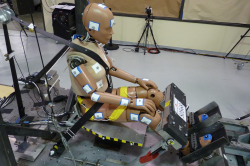
— Researchers at the University of Virginia’s Center for Applied Biomechanics have found a frontal car crash takes a toll on all occupants even when seat belts are buckled. But belted female occupants are are at an increased risk of serious injuries compared to male occupants wearing seat belts.
According to the study, female occupants wearing seat belts have 73% greater odds of serveral kinds of serious injuries, but even more so for injuries to the lower extremities.
Researchers compiled police-reported crash and injury data for 1998-2015 and focused on 31,000 female and male occupants aged 13 and older who wore seat belts in 23,000 frontal crashes. However, due to the type of crash test (frontal), women past the first trimester of pregnancy weren't included.
Newer vehicles generally decrease injuries, especially concerning cervical and abdominal injuries. And newer vehicles also offer more protection concerning skull fractures and injuries to the ankles, knees, hips and thighs.
But even in new vehicles, researchers haven't found significant reductions of rib and sternum fractures.
The primary government agency tasked with vehicle safety is the National Highway Traffic Safety Administration, but University of Virginia researchers believe the government may not be up to certain tasks.
“Until we understand the fundamental biomechanical factors that contribute to increased risk for females, we’ll be limited in our ability to close the risk gap. This will take substantial effort, and in my view the National Highway Traffic Safety Administration does not have the resources needed to address this issue.” - Jason Forman, principal scientist with the Center for Applied Biomechanics
The research also concluded what was previously known about occupants aged 66 and older. That age group is more susceptible to chest injuries likely caused by frail ribcages that typically occur as people grow older.
The University of Virginia study was published in the journal, Traffic Injury Prevention.




